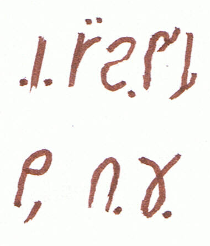
 Languages
Languages

Home | Author | Intro to the Period | Languages | Features
Conventions | Grammar | Verbal Forms | Modern-Old Tongue Dictionary | Old Tongue-Modern Dictionary | Old Hand
The Old Tongue is complex for lowlanders to learn, even moreso considering the dialects spoken around 1100. At this time there were no subjective pronouns. Since word order had more to do with emphasis than grammar, if you said Ye onkapike as a modern speaker might, you would be heard as saying not "You are riding," but rather "you are riding yourself."
Verbal forms define the sentence. Complex series of suffixes define affirmative and negative mode ("run" vs. "do not run"), tense ("run", "ran", "will run"), person ("I run", "you run", "he/she/it runs"), number ("I run", "we run"), and auxiliary modes ("I am running," "if I run," "I might run", "I can run"). Despite this complexity, there is no past perfect tense, and the command mode is undistinguised from the future tense. Fortunately, the Old Tongue has no gender.
Verbs are quite regular in the conjugations, fortunately. The "-de" infinitive is dropped and the proper suffix(es) added. If the preceding syllable ends in a consonant, as in INSERT, an "i" is added before the suffix. Most instances require person and tense (in that order), the vast majority of exceptions being when a mode takes the place of the tense. The plural suffix is added after tense and before the mode. The negative suffix is added at the end. Certain suffixes concatinate in combination.
Following is a table of person, tense, and affirmation combinations for the verb "to be," which is slightly irregular ("tachio" for "tachi" and "tachia for "tacha"). Further examples are available at the conjugations page.
| Positive Mode | present | future | past |
|---|---|---|---|
| 1st pers sing | tachio | tache | tachia |
| 2nd pers sing | tapi | tape | tapa |
| 3rd pers sing | tadi | tade | tada |
| 1st pers plur | tachima | tachema | tachama |
| 2nd pers plur | tapima | tapema | tapama |
| 3rd pers plur | tadima | tadema | tadama |
| Negative Mode | present | future | past |
|---|---|---|---|
| 1st pers sing | tachinyo | tachenyo | tachanyo |
| 2nd pers sing | tapyo | tapenyo | tapya |
| 3rd pers sing | taryi | tadenyo | tarya |
| 1st pers plur | tachimyo | tachemyo | tachamyo |
| 2nd pers plur | tapimyo | tapemyo | tapamyo |
| 3rd pers plur | tadimyo | tademyo | tadamyo |

Looking for an explanation of Verbal Forms?
